One Belt One Road (OBOR) Project: Social Justice and World Order
VerifiedAdded on 2022/11/25
|8
|2782
|265
Essay
AI Summary
This essay critically examines China's One Belt One Road (OBOR) initiative, a vast infrastructure and trade project spanning numerous countries. It explores the project's economic and political dimensions, particularly its implications for social justice. The essay delves into the arguments surrounding OBOR, analyzing its potential benefits like poverty reduction and infrastructure development, while also scrutinizing criticisms related to debt, exploitation of resources, and China's expansionist policies. It considers the geopolitical implications, examining how OBOR may be reshaping the global order and the responses from other major powers. The essay concludes by evaluating whether OBOR truly promotes global social justice or primarily serves China's economic and strategic interests, considering the unequal distribution of wealth, resources, and the potential for corruption and dominance. The analysis draws on academic research and media analyses to provide a comprehensive overview of this complex and transformative project.
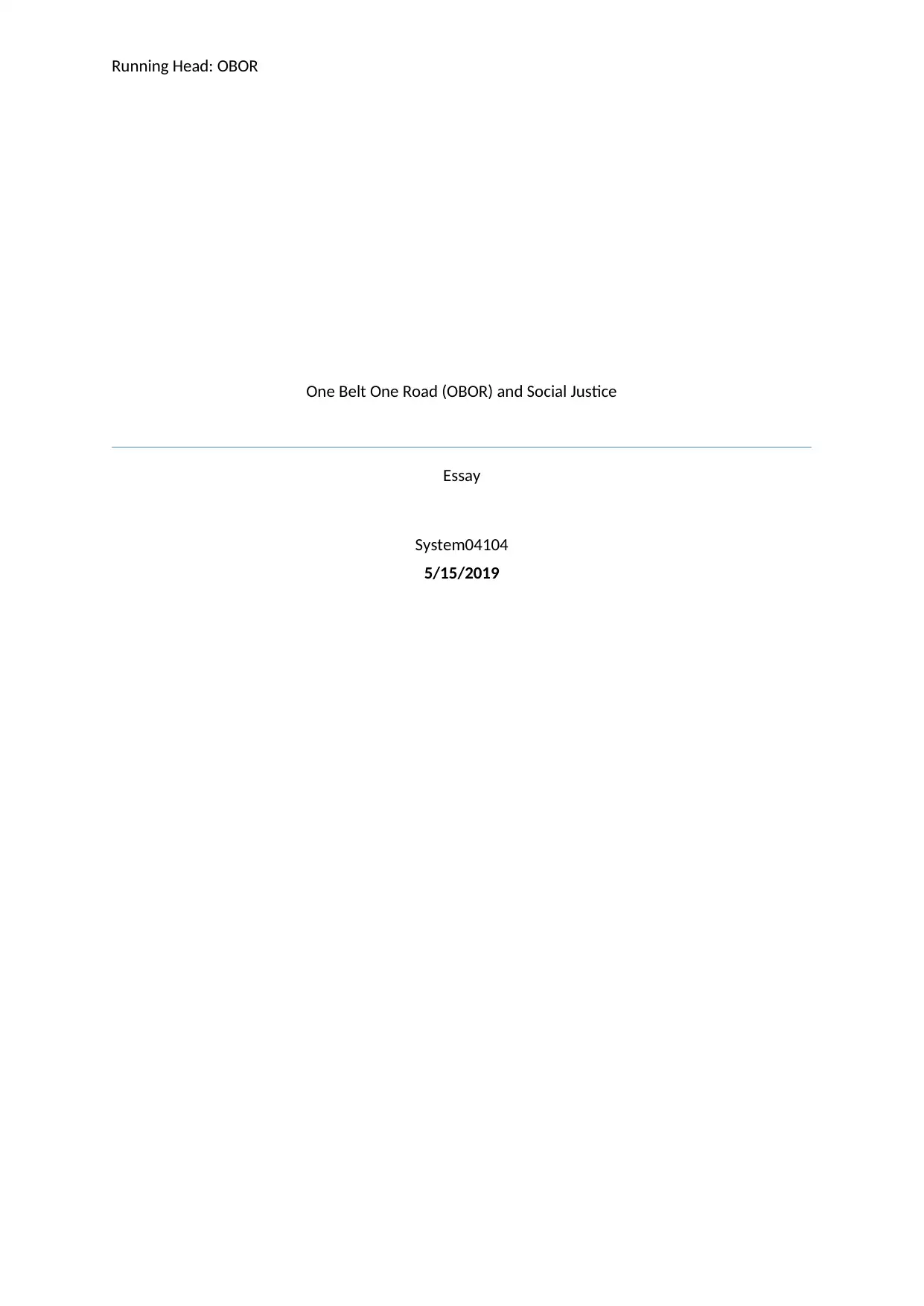
Running Head: OBOR
One Belt One Road (OBOR) and Social Justice
Essay
System04104
5/15/2019
One Belt One Road (OBOR) and Social Justice
Essay
System04104
5/15/2019
Paraphrase This Document
Need a fresh take? Get an instant paraphrase of this document with our AI Paraphraser
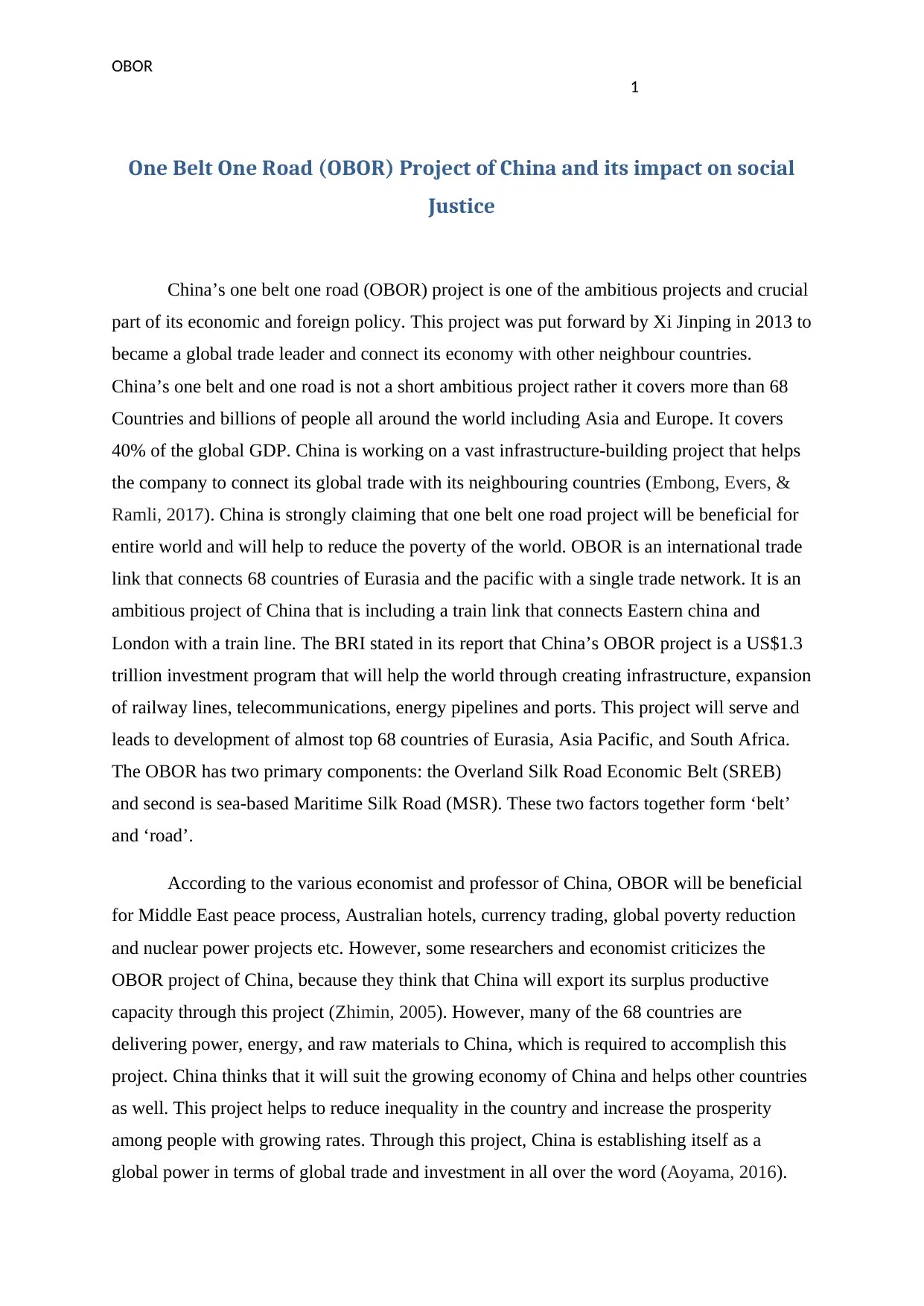
OBOR
1
One Belt One Road (OBOR) Project of China and its impact on social
Justice
China’s one belt one road (OBOR) project is one of the ambitious projects and crucial
part of its economic and foreign policy. This project was put forward by Xi Jinping in 2013 to
became a global trade leader and connect its economy with other neighbour countries.
China’s one belt and one road is not a short ambitious project rather it covers more than 68
Countries and billions of people all around the world including Asia and Europe. It covers
40% of the global GDP. China is working on a vast infrastructure-building project that helps
the company to connect its global trade with its neighbouring countries (Embong, Evers, &
Ramli, 2017). China is strongly claiming that one belt one road project will be beneficial for
entire world and will help to reduce the poverty of the world. OBOR is an international trade
link that connects 68 countries of Eurasia and the pacific with a single trade network. It is an
ambitious project of China that is including a train link that connects Eastern china and
London with a train line. The BRI stated in its report that China’s OBOR project is a US$1.3
trillion investment program that will help the world through creating infrastructure, expansion
of railway lines, telecommunications, energy pipelines and ports. This project will serve and
leads to development of almost top 68 countries of Eurasia, Asia Pacific, and South Africa.
The OBOR has two primary components: the Overland Silk Road Economic Belt (SREB)
and second is sea-based Maritime Silk Road (MSR). These two factors together form ‘belt’
and ‘road’.
According to the various economist and professor of China, OBOR will be beneficial
for Middle East peace process, Australian hotels, currency trading, global poverty reduction
and nuclear power projects etc. However, some researchers and economist criticizes the
OBOR project of China, because they think that China will export its surplus productive
capacity through this project (Zhimin, 2005). However, many of the 68 countries are
delivering power, energy, and raw materials to China, which is required to accomplish this
project. China thinks that it will suit the growing economy of China and helps other countries
as well. This project helps to reduce inequality in the country and increase the prosperity
among people with growing rates. Through this project, China is establishing itself as a
global power in terms of global trade and investment in all over the word (Aoyama, 2016).
1
One Belt One Road (OBOR) Project of China and its impact on social
Justice
China’s one belt one road (OBOR) project is one of the ambitious projects and crucial
part of its economic and foreign policy. This project was put forward by Xi Jinping in 2013 to
became a global trade leader and connect its economy with other neighbour countries.
China’s one belt and one road is not a short ambitious project rather it covers more than 68
Countries and billions of people all around the world including Asia and Europe. It covers
40% of the global GDP. China is working on a vast infrastructure-building project that helps
the company to connect its global trade with its neighbouring countries (Embong, Evers, &
Ramli, 2017). China is strongly claiming that one belt one road project will be beneficial for
entire world and will help to reduce the poverty of the world. OBOR is an international trade
link that connects 68 countries of Eurasia and the pacific with a single trade network. It is an
ambitious project of China that is including a train link that connects Eastern china and
London with a train line. The BRI stated in its report that China’s OBOR project is a US$1.3
trillion investment program that will help the world through creating infrastructure, expansion
of railway lines, telecommunications, energy pipelines and ports. This project will serve and
leads to development of almost top 68 countries of Eurasia, Asia Pacific, and South Africa.
The OBOR has two primary components: the Overland Silk Road Economic Belt (SREB)
and second is sea-based Maritime Silk Road (MSR). These two factors together form ‘belt’
and ‘road’.
According to the various economist and professor of China, OBOR will be beneficial
for Middle East peace process, Australian hotels, currency trading, global poverty reduction
and nuclear power projects etc. However, some researchers and economist criticizes the
OBOR project of China, because they think that China will export its surplus productive
capacity through this project (Zhimin, 2005). However, many of the 68 countries are
delivering power, energy, and raw materials to China, which is required to accomplish this
project. China thinks that it will suit the growing economy of China and helps other countries
as well. This project helps to reduce inequality in the country and increase the prosperity
among people with growing rates. Through this project, China is establishing itself as a
global power in terms of global trade and investment in all over the word (Aoyama, 2016).
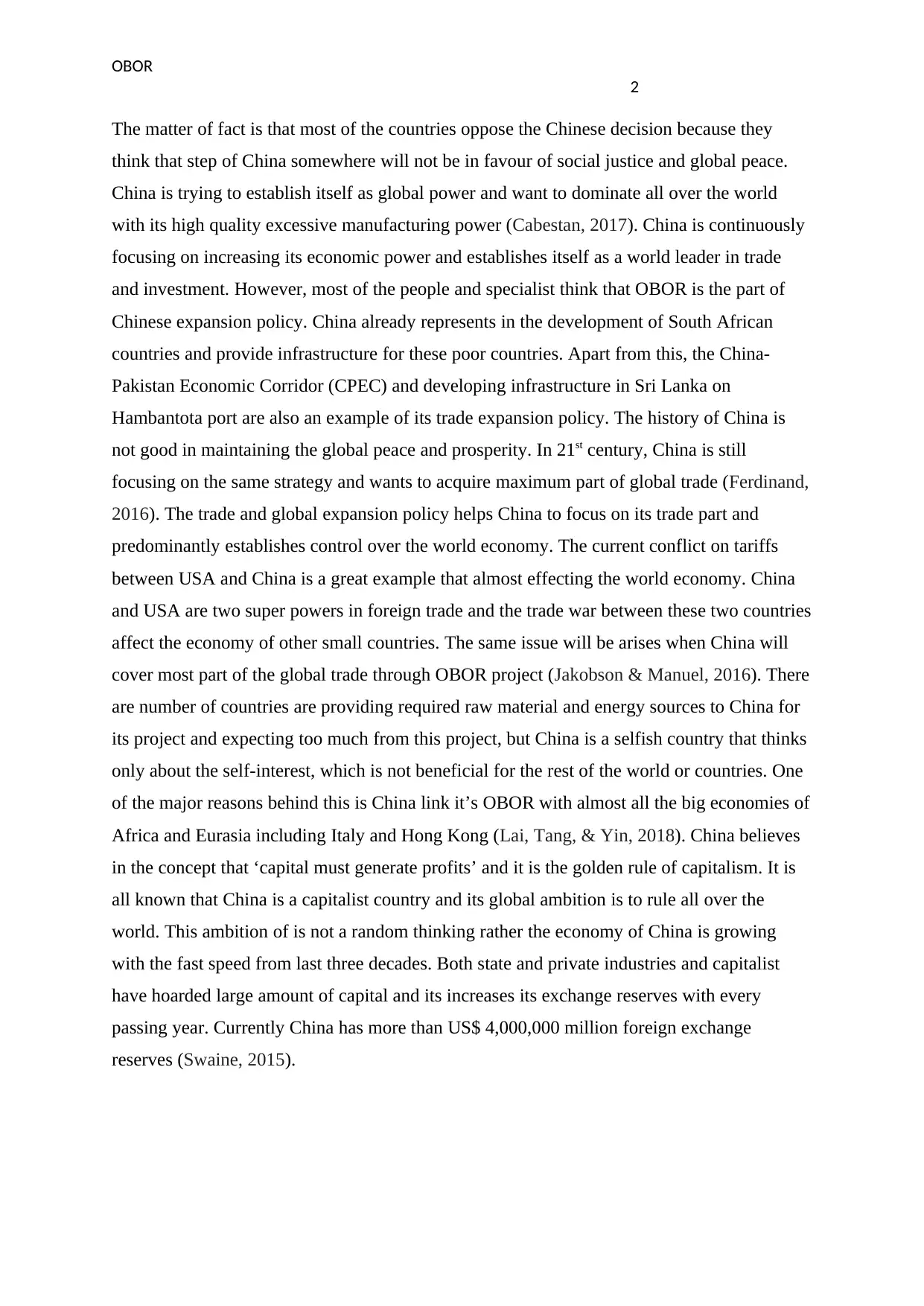
OBOR
2
The matter of fact is that most of the countries oppose the Chinese decision because they
think that step of China somewhere will not be in favour of social justice and global peace.
China is trying to establish itself as global power and want to dominate all over the world
with its high quality excessive manufacturing power (Cabestan, 2017). China is continuously
focusing on increasing its economic power and establishes itself as a world leader in trade
and investment. However, most of the people and specialist think that OBOR is the part of
Chinese expansion policy. China already represents in the development of South African
countries and provide infrastructure for these poor countries. Apart from this, the China-
Pakistan Economic Corridor (CPEC) and developing infrastructure in Sri Lanka on
Hambantota port are also an example of its trade expansion policy. The history of China is
not good in maintaining the global peace and prosperity. In 21st century, China is still
focusing on the same strategy and wants to acquire maximum part of global trade (Ferdinand,
2016). The trade and global expansion policy helps China to focus on its trade part and
predominantly establishes control over the world economy. The current conflict on tariffs
between USA and China is a great example that almost effecting the world economy. China
and USA are two super powers in foreign trade and the trade war between these two countries
affect the economy of other small countries. The same issue will be arises when China will
cover most part of the global trade through OBOR project (Jakobson & Manuel, 2016). There
are number of countries are providing required raw material and energy sources to China for
its project and expecting too much from this project, but China is a selfish country that thinks
only about the self-interest, which is not beneficial for the rest of the world or countries. One
of the major reasons behind this is China link it’s OBOR with almost all the big economies of
Africa and Eurasia including Italy and Hong Kong (Lai, Tang, & Yin, 2018). China believes
in the concept that ‘capital must generate profits’ and it is the golden rule of capitalism. It is
all known that China is a capitalist country and its global ambition is to rule all over the
world. This ambition of is not a random thinking rather the economy of China is growing
with the fast speed from last three decades. Both state and private industries and capitalist
have hoarded large amount of capital and its increases its exchange reserves with every
passing year. Currently China has more than US$ 4,000,000 million foreign exchange
reserves (Swaine, 2015).
2
The matter of fact is that most of the countries oppose the Chinese decision because they
think that step of China somewhere will not be in favour of social justice and global peace.
China is trying to establish itself as global power and want to dominate all over the world
with its high quality excessive manufacturing power (Cabestan, 2017). China is continuously
focusing on increasing its economic power and establishes itself as a world leader in trade
and investment. However, most of the people and specialist think that OBOR is the part of
Chinese expansion policy. China already represents in the development of South African
countries and provide infrastructure for these poor countries. Apart from this, the China-
Pakistan Economic Corridor (CPEC) and developing infrastructure in Sri Lanka on
Hambantota port are also an example of its trade expansion policy. The history of China is
not good in maintaining the global peace and prosperity. In 21st century, China is still
focusing on the same strategy and wants to acquire maximum part of global trade (Ferdinand,
2016). The trade and global expansion policy helps China to focus on its trade part and
predominantly establishes control over the world economy. The current conflict on tariffs
between USA and China is a great example that almost effecting the world economy. China
and USA are two super powers in foreign trade and the trade war between these two countries
affect the economy of other small countries. The same issue will be arises when China will
cover most part of the global trade through OBOR project (Jakobson & Manuel, 2016). There
are number of countries are providing required raw material and energy sources to China for
its project and expecting too much from this project, but China is a selfish country that thinks
only about the self-interest, which is not beneficial for the rest of the world or countries. One
of the major reasons behind this is China link it’s OBOR with almost all the big economies of
Africa and Eurasia including Italy and Hong Kong (Lai, Tang, & Yin, 2018). China believes
in the concept that ‘capital must generate profits’ and it is the golden rule of capitalism. It is
all known that China is a capitalist country and its global ambition is to rule all over the
world. This ambition of is not a random thinking rather the economy of China is growing
with the fast speed from last three decades. Both state and private industries and capitalist
have hoarded large amount of capital and its increases its exchange reserves with every
passing year. Currently China has more than US$ 4,000,000 million foreign exchange
reserves (Swaine, 2015).
⊘ This is a preview!⊘
Do you want full access?
Subscribe today to unlock all pages.

Trusted by 1+ million students worldwide
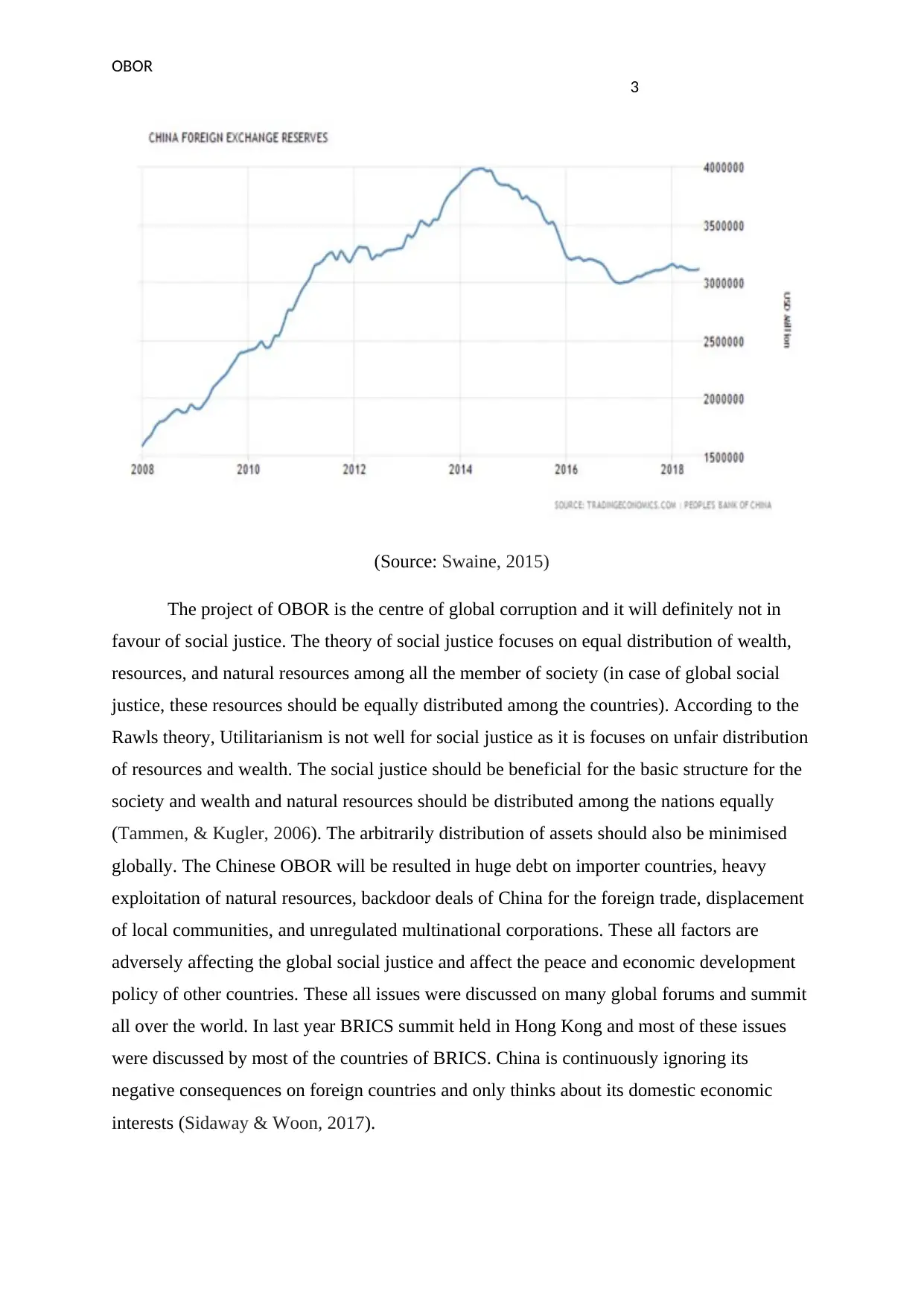
OBOR
3
(Source: Swaine, 2015)
The project of OBOR is the centre of global corruption and it will definitely not in
favour of social justice. The theory of social justice focuses on equal distribution of wealth,
resources, and natural resources among all the member of society (in case of global social
justice, these resources should be equally distributed among the countries). According to the
Rawls theory, Utilitarianism is not well for social justice as it is focuses on unfair distribution
of resources and wealth. The social justice should be beneficial for the basic structure for the
society and wealth and natural resources should be distributed among the nations equally
(Tammen, & Kugler, 2006). The arbitrarily distribution of assets should also be minimised
globally. The Chinese OBOR will be resulted in huge debt on importer countries, heavy
exploitation of natural resources, backdoor deals of China for the foreign trade, displacement
of local communities, and unregulated multinational corporations. These all factors are
adversely affecting the global social justice and affect the peace and economic development
policy of other countries. These all issues were discussed on many global forums and summit
all over the world. In last year BRICS summit held in Hong Kong and most of these issues
were discussed by most of the countries of BRICS. China is continuously ignoring its
negative consequences on foreign countries and only thinks about its domestic economic
interests (Sidaway & Woon, 2017).
3
(Source: Swaine, 2015)
The project of OBOR is the centre of global corruption and it will definitely not in
favour of social justice. The theory of social justice focuses on equal distribution of wealth,
resources, and natural resources among all the member of society (in case of global social
justice, these resources should be equally distributed among the countries). According to the
Rawls theory, Utilitarianism is not well for social justice as it is focuses on unfair distribution
of resources and wealth. The social justice should be beneficial for the basic structure for the
society and wealth and natural resources should be distributed among the nations equally
(Tammen, & Kugler, 2006). The arbitrarily distribution of assets should also be minimised
globally. The Chinese OBOR will be resulted in huge debt on importer countries, heavy
exploitation of natural resources, backdoor deals of China for the foreign trade, displacement
of local communities, and unregulated multinational corporations. These all factors are
adversely affecting the global social justice and affect the peace and economic development
policy of other countries. These all issues were discussed on many global forums and summit
all over the world. In last year BRICS summit held in Hong Kong and most of these issues
were discussed by most of the countries of BRICS. China is continuously ignoring its
negative consequences on foreign countries and only thinks about its domestic economic
interests (Sidaway & Woon, 2017).
Paraphrase This Document
Need a fresh take? Get an instant paraphrase of this document with our AI Paraphraser
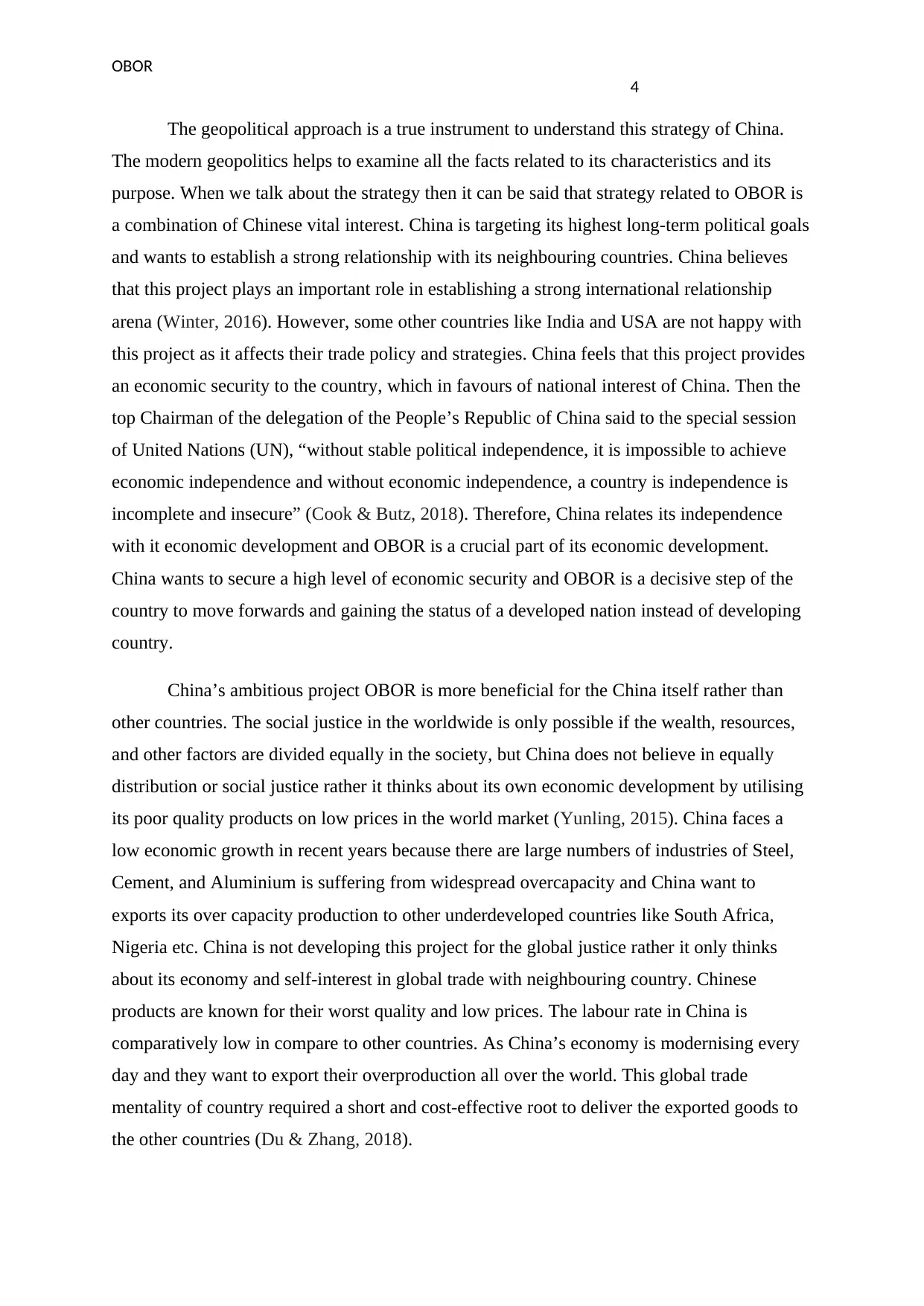
OBOR
4
The geopolitical approach is a true instrument to understand this strategy of China.
The modern geopolitics helps to examine all the facts related to its characteristics and its
purpose. When we talk about the strategy then it can be said that strategy related to OBOR is
a combination of Chinese vital interest. China is targeting its highest long-term political goals
and wants to establish a strong relationship with its neighbouring countries. China believes
that this project plays an important role in establishing a strong international relationship
arena (Winter, 2016). However, some other countries like India and USA are not happy with
this project as it affects their trade policy and strategies. China feels that this project provides
an economic security to the country, which in favours of national interest of China. Then the
top Chairman of the delegation of the People’s Republic of China said to the special session
of United Nations (UN), “without stable political independence, it is impossible to achieve
economic independence and without economic independence, a country is independence is
incomplete and insecure” (Cook & Butz, 2018). Therefore, China relates its independence
with it economic development and OBOR is a crucial part of its economic development.
China wants to secure a high level of economic security and OBOR is a decisive step of the
country to move forwards and gaining the status of a developed nation instead of developing
country.
China’s ambitious project OBOR is more beneficial for the China itself rather than
other countries. The social justice in the worldwide is only possible if the wealth, resources,
and other factors are divided equally in the society, but China does not believe in equally
distribution or social justice rather it thinks about its own economic development by utilising
its poor quality products on low prices in the world market (Yunling, 2015). China faces a
low economic growth in recent years because there are large numbers of industries of Steel,
Cement, and Aluminium is suffering from widespread overcapacity and China want to
exports its over capacity production to other underdeveloped countries like South Africa,
Nigeria etc. China is not developing this project for the global justice rather it only thinks
about its economy and self-interest in global trade with neighbouring country. Chinese
products are known for their worst quality and low prices. The labour rate in China is
comparatively low in compare to other countries. As China’s economy is modernising every
day and they want to export their overproduction all over the world. This global trade
mentality of country required a short and cost-effective root to deliver the exported goods to
the other countries (Du & Zhang, 2018).
4
The geopolitical approach is a true instrument to understand this strategy of China.
The modern geopolitics helps to examine all the facts related to its characteristics and its
purpose. When we talk about the strategy then it can be said that strategy related to OBOR is
a combination of Chinese vital interest. China is targeting its highest long-term political goals
and wants to establish a strong relationship with its neighbouring countries. China believes
that this project plays an important role in establishing a strong international relationship
arena (Winter, 2016). However, some other countries like India and USA are not happy with
this project as it affects their trade policy and strategies. China feels that this project provides
an economic security to the country, which in favours of national interest of China. Then the
top Chairman of the delegation of the People’s Republic of China said to the special session
of United Nations (UN), “without stable political independence, it is impossible to achieve
economic independence and without economic independence, a country is independence is
incomplete and insecure” (Cook & Butz, 2018). Therefore, China relates its independence
with it economic development and OBOR is a crucial part of its economic development.
China wants to secure a high level of economic security and OBOR is a decisive step of the
country to move forwards and gaining the status of a developed nation instead of developing
country.
China’s ambitious project OBOR is more beneficial for the China itself rather than
other countries. The social justice in the worldwide is only possible if the wealth, resources,
and other factors are divided equally in the society, but China does not believe in equally
distribution or social justice rather it thinks about its own economic development by utilising
its poor quality products on low prices in the world market (Yunling, 2015). China faces a
low economic growth in recent years because there are large numbers of industries of Steel,
Cement, and Aluminium is suffering from widespread overcapacity and China want to
exports its over capacity production to other underdeveloped countries like South Africa,
Nigeria etc. China is not developing this project for the global justice rather it only thinks
about its economy and self-interest in global trade with neighbouring country. Chinese
products are known for their worst quality and low prices. The labour rate in China is
comparatively low in compare to other countries. As China’s economy is modernising every
day and they want to export their overproduction all over the world. This global trade
mentality of country required a short and cost-effective root to deliver the exported goods to
the other countries (Du & Zhang, 2018).
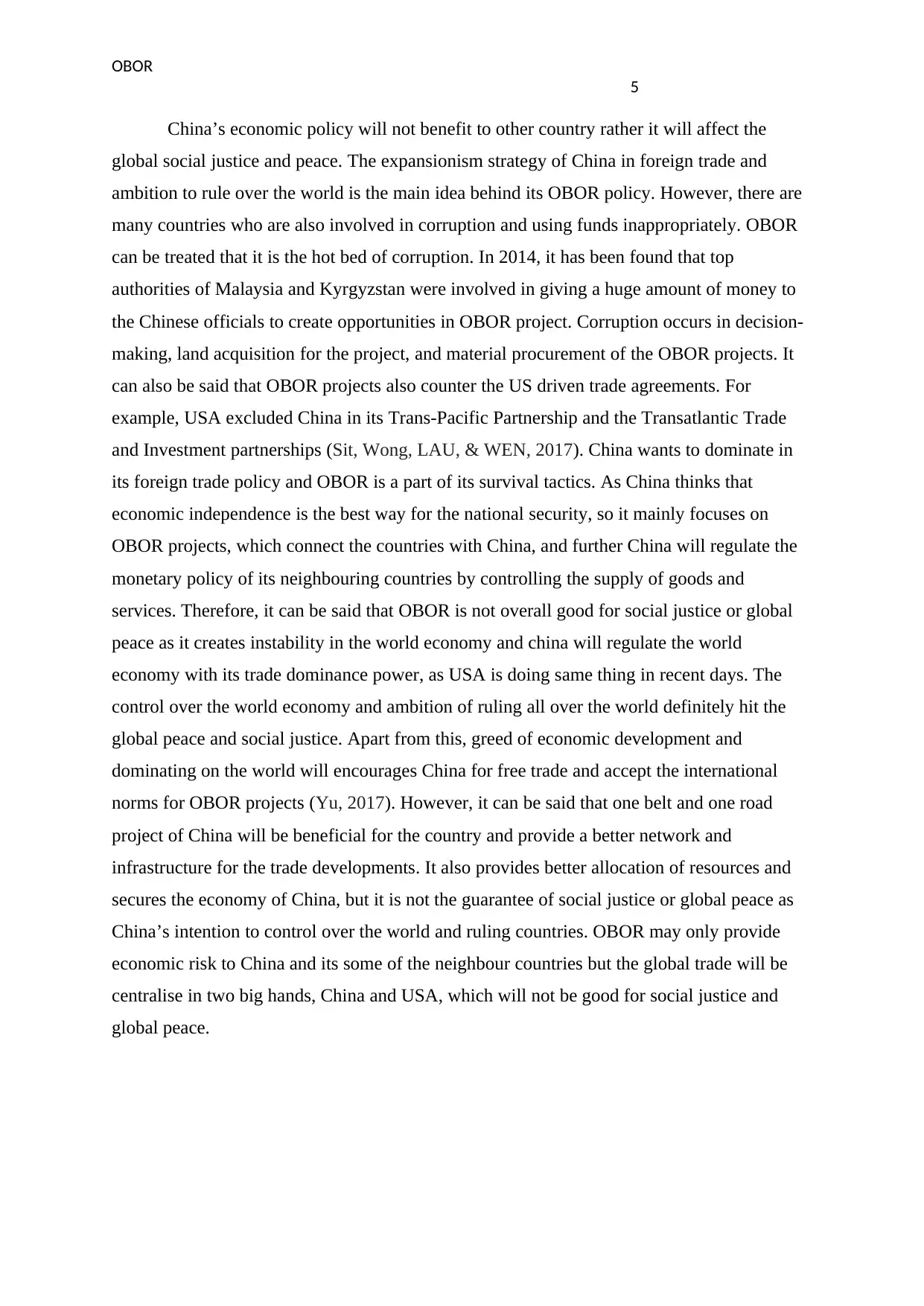
OBOR
5
China’s economic policy will not benefit to other country rather it will affect the
global social justice and peace. The expansionism strategy of China in foreign trade and
ambition to rule over the world is the main idea behind its OBOR policy. However, there are
many countries who are also involved in corruption and using funds inappropriately. OBOR
can be treated that it is the hot bed of corruption. In 2014, it has been found that top
authorities of Malaysia and Kyrgyzstan were involved in giving a huge amount of money to
the Chinese officials to create opportunities in OBOR project. Corruption occurs in decision-
making, land acquisition for the project, and material procurement of the OBOR projects. It
can also be said that OBOR projects also counter the US driven trade agreements. For
example, USA excluded China in its Trans-Pacific Partnership and the Transatlantic Trade
and Investment partnerships (Sit, Wong, LAU, & WEN, 2017). China wants to dominate in
its foreign trade policy and OBOR is a part of its survival tactics. As China thinks that
economic independence is the best way for the national security, so it mainly focuses on
OBOR projects, which connect the countries with China, and further China will regulate the
monetary policy of its neighbouring countries by controlling the supply of goods and
services. Therefore, it can be said that OBOR is not overall good for social justice or global
peace as it creates instability in the world economy and china will regulate the world
economy with its trade dominance power, as USA is doing same thing in recent days. The
control over the world economy and ambition of ruling all over the world definitely hit the
global peace and social justice. Apart from this, greed of economic development and
dominating on the world will encourages China for free trade and accept the international
norms for OBOR projects (Yu, 2017). However, it can be said that one belt and one road
project of China will be beneficial for the country and provide a better network and
infrastructure for the trade developments. It also provides better allocation of resources and
secures the economy of China, but it is not the guarantee of social justice or global peace as
China’s intention to control over the world and ruling countries. OBOR may only provide
economic risk to China and its some of the neighbour countries but the global trade will be
centralise in two big hands, China and USA, which will not be good for social justice and
global peace.
5
China’s economic policy will not benefit to other country rather it will affect the
global social justice and peace. The expansionism strategy of China in foreign trade and
ambition to rule over the world is the main idea behind its OBOR policy. However, there are
many countries who are also involved in corruption and using funds inappropriately. OBOR
can be treated that it is the hot bed of corruption. In 2014, it has been found that top
authorities of Malaysia and Kyrgyzstan were involved in giving a huge amount of money to
the Chinese officials to create opportunities in OBOR project. Corruption occurs in decision-
making, land acquisition for the project, and material procurement of the OBOR projects. It
can also be said that OBOR projects also counter the US driven trade agreements. For
example, USA excluded China in its Trans-Pacific Partnership and the Transatlantic Trade
and Investment partnerships (Sit, Wong, LAU, & WEN, 2017). China wants to dominate in
its foreign trade policy and OBOR is a part of its survival tactics. As China thinks that
economic independence is the best way for the national security, so it mainly focuses on
OBOR projects, which connect the countries with China, and further China will regulate the
monetary policy of its neighbouring countries by controlling the supply of goods and
services. Therefore, it can be said that OBOR is not overall good for social justice or global
peace as it creates instability in the world economy and china will regulate the world
economy with its trade dominance power, as USA is doing same thing in recent days. The
control over the world economy and ambition of ruling all over the world definitely hit the
global peace and social justice. Apart from this, greed of economic development and
dominating on the world will encourages China for free trade and accept the international
norms for OBOR projects (Yu, 2017). However, it can be said that one belt and one road
project of China will be beneficial for the country and provide a better network and
infrastructure for the trade developments. It also provides better allocation of resources and
secures the economy of China, but it is not the guarantee of social justice or global peace as
China’s intention to control over the world and ruling countries. OBOR may only provide
economic risk to China and its some of the neighbour countries but the global trade will be
centralise in two big hands, China and USA, which will not be good for social justice and
global peace.
⊘ This is a preview!⊘
Do you want full access?
Subscribe today to unlock all pages.

Trusted by 1+ million students worldwide
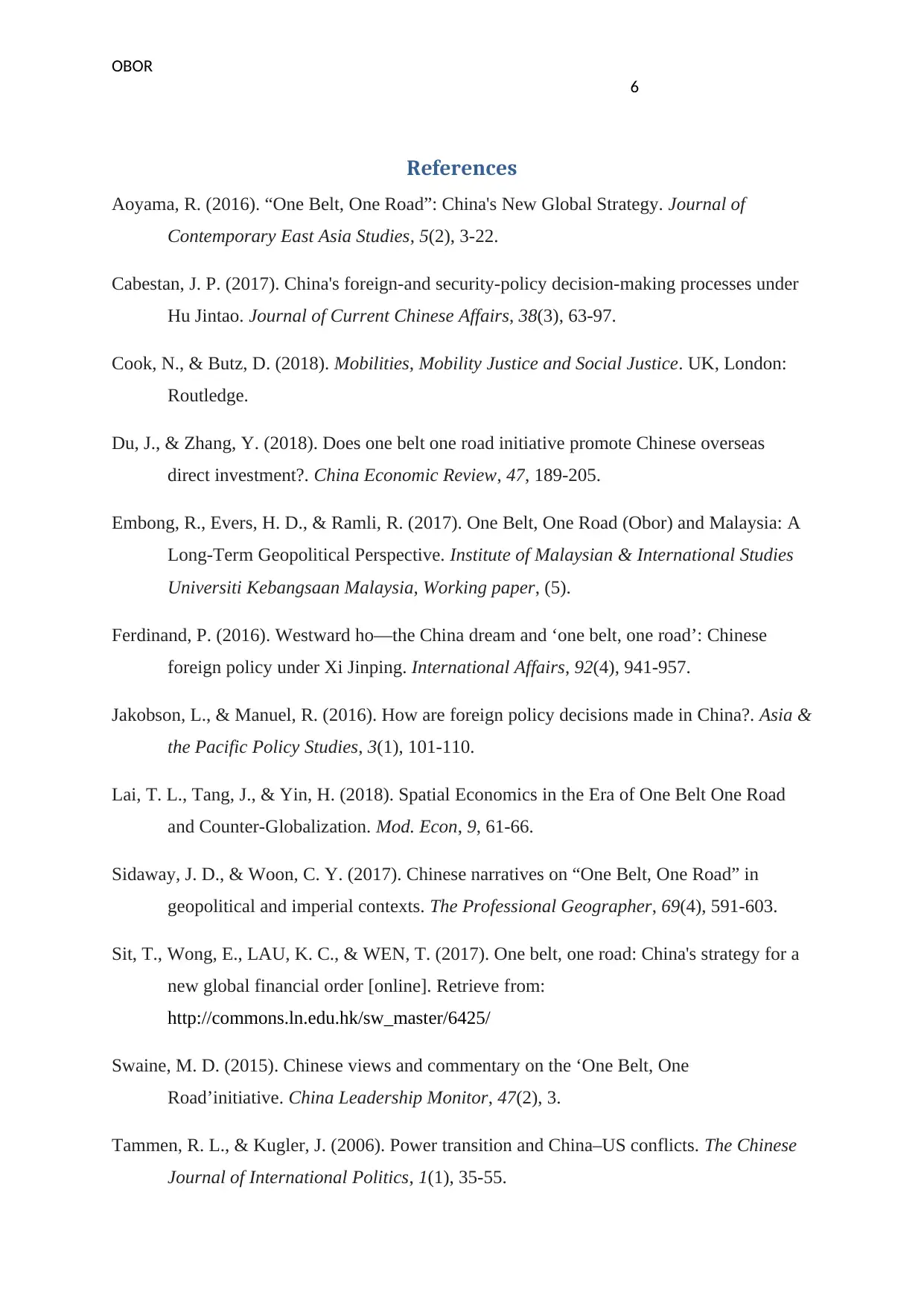
OBOR
6
References
Aoyama, R. (2016). “One Belt, One Road”: China's New Global Strategy. Journal of
Contemporary East Asia Studies, 5(2), 3-22.
Cabestan, J. P. (2017). China's foreign-and security-policy decision-making processes under
Hu Jintao. Journal of Current Chinese Affairs, 38(3), 63-97.
Cook, N., & Butz, D. (2018). Mobilities, Mobility Justice and Social Justice. UK, London:
Routledge.
Du, J., & Zhang, Y. (2018). Does one belt one road initiative promote Chinese overseas
direct investment?. China Economic Review, 47, 189-205.
Embong, R., Evers, H. D., & Ramli, R. (2017). One Belt, One Road (Obor) and Malaysia: A
Long-Term Geopolitical Perspective. Institute of Malaysian & International Studies
Universiti Kebangsaan Malaysia, Working paper, (5).
Ferdinand, P. (2016). Westward ho—the China dream and ‘one belt, one road’: Chinese
foreign policy under Xi Jinping. International Affairs, 92(4), 941-957.
Jakobson, L., & Manuel, R. (2016). How are foreign policy decisions made in China?. Asia &
the Pacific Policy Studies, 3(1), 101-110.
Lai, T. L., Tang, J., & Yin, H. (2018). Spatial Economics in the Era of One Belt One Road
and Counter-Globalization. Mod. Econ, 9, 61-66.
Sidaway, J. D., & Woon, C. Y. (2017). Chinese narratives on “One Belt, One Road” in
geopolitical and imperial contexts. The Professional Geographer, 69(4), 591-603.
Sit, T., Wong, E., LAU, K. C., & WEN, T. (2017). One belt, one road: China's strategy for a
new global financial order [online]. Retrieve from:
http://commons.ln.edu.hk/sw_master/6425/
Swaine, M. D. (2015). Chinese views and commentary on the ‘One Belt, One
Road’initiative. China Leadership Monitor, 47(2), 3.
Tammen, R. L., & Kugler, J. (2006). Power transition and China–US conflicts. The Chinese
Journal of International Politics, 1(1), 35-55.
6
References
Aoyama, R. (2016). “One Belt, One Road”: China's New Global Strategy. Journal of
Contemporary East Asia Studies, 5(2), 3-22.
Cabestan, J. P. (2017). China's foreign-and security-policy decision-making processes under
Hu Jintao. Journal of Current Chinese Affairs, 38(3), 63-97.
Cook, N., & Butz, D. (2018). Mobilities, Mobility Justice and Social Justice. UK, London:
Routledge.
Du, J., & Zhang, Y. (2018). Does one belt one road initiative promote Chinese overseas
direct investment?. China Economic Review, 47, 189-205.
Embong, R., Evers, H. D., & Ramli, R. (2017). One Belt, One Road (Obor) and Malaysia: A
Long-Term Geopolitical Perspective. Institute of Malaysian & International Studies
Universiti Kebangsaan Malaysia, Working paper, (5).
Ferdinand, P. (2016). Westward ho—the China dream and ‘one belt, one road’: Chinese
foreign policy under Xi Jinping. International Affairs, 92(4), 941-957.
Jakobson, L., & Manuel, R. (2016). How are foreign policy decisions made in China?. Asia &
the Pacific Policy Studies, 3(1), 101-110.
Lai, T. L., Tang, J., & Yin, H. (2018). Spatial Economics in the Era of One Belt One Road
and Counter-Globalization. Mod. Econ, 9, 61-66.
Sidaway, J. D., & Woon, C. Y. (2017). Chinese narratives on “One Belt, One Road” in
geopolitical and imperial contexts. The Professional Geographer, 69(4), 591-603.
Sit, T., Wong, E., LAU, K. C., & WEN, T. (2017). One belt, one road: China's strategy for a
new global financial order [online]. Retrieve from:
http://commons.ln.edu.hk/sw_master/6425/
Swaine, M. D. (2015). Chinese views and commentary on the ‘One Belt, One
Road’initiative. China Leadership Monitor, 47(2), 3.
Tammen, R. L., & Kugler, J. (2006). Power transition and China–US conflicts. The Chinese
Journal of International Politics, 1(1), 35-55.
Paraphrase This Document
Need a fresh take? Get an instant paraphrase of this document with our AI Paraphraser
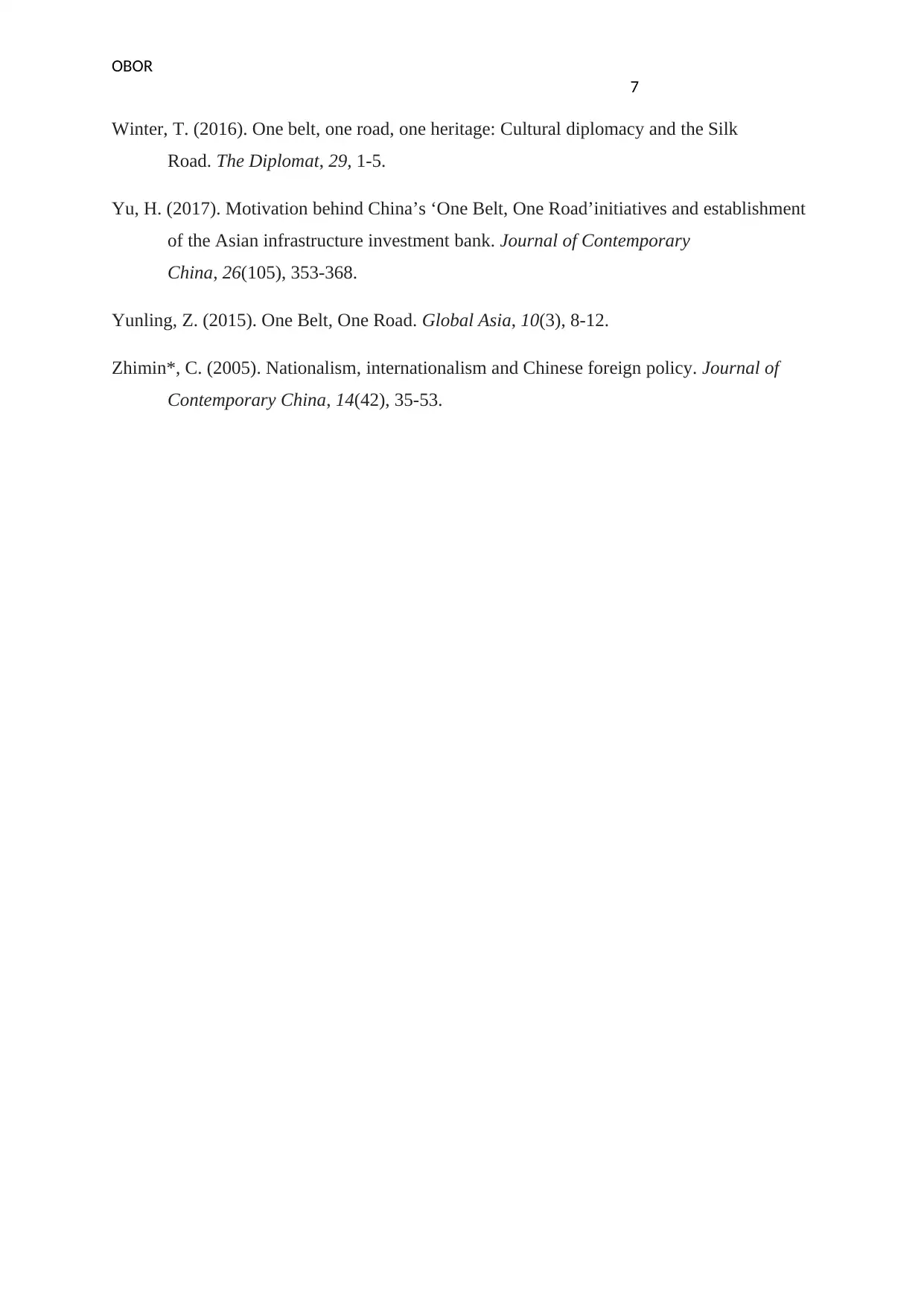
OBOR
7
Winter, T. (2016). One belt, one road, one heritage: Cultural diplomacy and the Silk
Road. The Diplomat, 29, 1-5.
Yu, H. (2017). Motivation behind China’s ‘One Belt, One Road’initiatives and establishment
of the Asian infrastructure investment bank. Journal of Contemporary
China, 26(105), 353-368.
Yunling, Z. (2015). One Belt, One Road. Global Asia, 10(3), 8-12.
Zhimin*, C. (2005). Nationalism, internationalism and Chinese foreign policy. Journal of
Contemporary China, 14(42), 35-53.
7
Winter, T. (2016). One belt, one road, one heritage: Cultural diplomacy and the Silk
Road. The Diplomat, 29, 1-5.
Yu, H. (2017). Motivation behind China’s ‘One Belt, One Road’initiatives and establishment
of the Asian infrastructure investment bank. Journal of Contemporary
China, 26(105), 353-368.
Yunling, Z. (2015). One Belt, One Road. Global Asia, 10(3), 8-12.
Zhimin*, C. (2005). Nationalism, internationalism and Chinese foreign policy. Journal of
Contemporary China, 14(42), 35-53.
1 out of 8
Related Documents
Your All-in-One AI-Powered Toolkit for Academic Success.
+13062052269
info@desklib.com
Available 24*7 on WhatsApp / Email
![[object Object]](/_next/static/media/star-bottom.7253800d.svg)
Unlock your academic potential
Copyright © 2020–2026 A2Z Services. All Rights Reserved. Developed and managed by ZUCOL.





